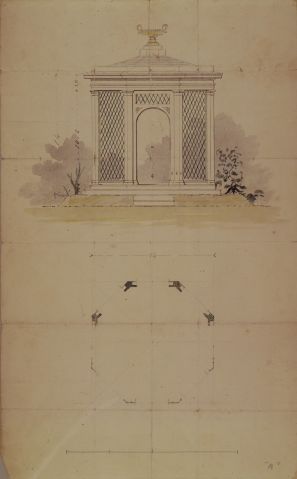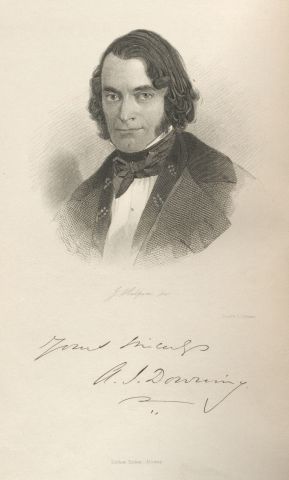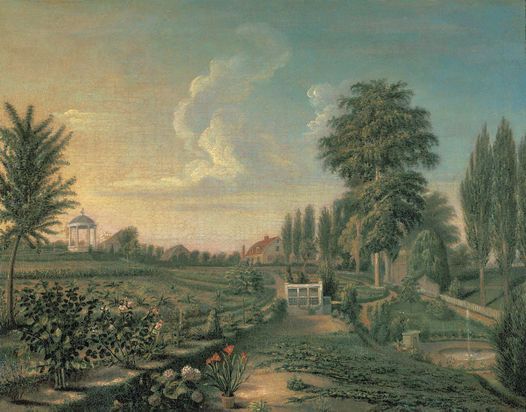Difference between revisions of "Home"
M-westerby (talk | contribs) |
|||
| (24 intermediate revisions by 9 users not shown) | |||
| Line 1: | Line 1: | ||
| + | {{break}} | ||
===''Welcome''=== | ===''Welcome''=== | ||
| − | + | The ''History of Early American Landscape Design'' digital resource is an inquiry into the language of early American landscape aesthetics and garden design in the colonial and national periods. Thousands of texts are combined with a corpus of more than 1700 images in order to trace the development of landscape and garden terminology from British colonial America to the mid-19th century. By placing terms in relation to representations in the visual record, the project clarifies their use and meanings, providing for well-informed histories of designed landscapes in early America. | |
| − | The ''History of Early American Landscape Design'' digital resource | ||
| − | The project | + | The project is organized by 100 keywords, supported by 100 featured places and historical figures. Without claiming to be comprehensive, this project models an approach to the study of landscapes and gardens that helps scholars consider past cultural conditions, uncover former appearances, and better understand the experiences and meanings of designed environments as they were built, and also as they were imagined. |
| − | + | {{break}} | |
| − | + | {{Showcase main}} | |
| + | {{break}} | ||
| − | + | ===''Introductory Essays''=== | |
| − | + | {{:Essays}} | |
| − | |||
| − | |||
{{break}} | {{break}} | ||
| − | + | Read more about the Center's [https://www.nga.gov/research/casva/research-projects.html research projects]. | |
| − | |||
| − | Read more about | ||
| − | |||
| − | <div style="font-size:14px; font-family: | + | <div style="font-size:14px; font-family: Georgia-serif; color:#777777; line-height:2em;">Banner Images:</div> |
| − | <div style="font-size:14px; font-family: | + | <div style="font-size:14px; font-family: Georgia-serif; line-height:2em;">[[:File:0464.jpg|Nicolino Calyo, ''Harlem, the Country House of Dr. Edmondson'', 1834]]<br> |
| − | <div style="font-size:14px; font-family: | + | <div style="font-size:14px; font-family: Georgia-serif;">[[:File:1213.jpg|C. A. Hedin, “Front Elevation on Live Oak Street,” 1853]]<br></div> |
| − | <div style="font-size:14px; font-family: | + | <div style="font-size:14px; font-family: Georgia-serif;">[[:File:0072.jpg|Thomas Jefferson, Plan of an orchard at Monticello, c. 1778]]<br></div> |
| − | <div style="font-size:14px; font-family: | + | <div style="font-size:14px; font-family: Georgia-serif;">[[:File:0033.jpg|Robert Mills, ''Plan of the Mall'', Washington, DC, 1841]]</div> |
| − | |||
Latest revision as of 15:29, August 12, 2021
Welcome
The History of Early American Landscape Design digital resource is an inquiry into the language of early American landscape aesthetics and garden design in the colonial and national periods. Thousands of texts are combined with a corpus of more than 1700 images in order to trace the development of landscape and garden terminology from British colonial America to the mid-19th century. By placing terms in relation to representations in the visual record, the project clarifies their use and meanings, providing for well-informed histories of designed landscapes in early America.
The project is organized by 100 keywords, supported by 100 featured places and historical figures. Without claiming to be comprehensive, this project models an approach to the study of landscapes and gardens that helps scholars consider past cultural conditions, uncover former appearances, and better understand the experiences and meanings of designed environments as they were built, and also as they were imagined.
Introductory Essays
These essays first appeared in the original publication Keywords in American Landscape Design (Yale University Press, 2010) from which this site originated. The investigation into the history of early American landscape design has continued with the advantage of the digital platform and the addition of approximately one hundred individual pages dedicated to People and to Places to the original one hundred Keywords pages. These introductory essays remain a fundamental contribution to the project with insight and guidance on navigating its content.
Read more about the Center's research projects.





